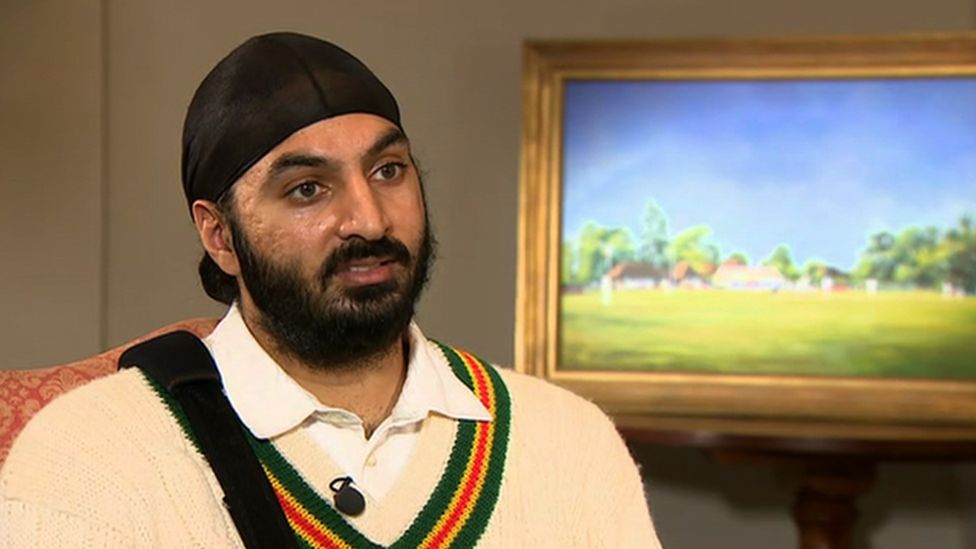Why do many South Asians regard mental illness as taboo?
- Published

England cricketer Monty Panesar has fought a public battle with mental health issues. He believes a culture of shame and labelling among the South Asian community is a barrier to others like him accessing help. But why do some in the community struggle with this issue?
Panesar, who has suffered from paranoia and anxiety, is one of the few British Asian celebrities to speak openly about mental health problems.
He was released by Essex County Cricket Club in 2015 and soon after admitted he was struggling to cope.
"The cricketing world was very supportive and understanding," said the 34-year-old, who is now a mental health ambassador for the Professional Cricketers' Association.
"But in our Asian community there was no understanding of what mental heath is.
"When you play cricket you want to be perceived as strong, resilient, able to be competitive.
"A lot of young Asians came forward [after I went public] and said, 'we're glad you opened up because it's a huge taboo in our community'."
Another Asian celebrity to have suffered with mental illness is Steve Kapur - better known as the musician Apache Indian, whose 1993 single Boom Shack-A-Lak reached number 5 in the UK.
He shares the perception that his community has a particular problem with acknowledging mental health issues.
"Whether it's cultural, embarrassment, or whatever it is - we brush a lot of things under the carpet," he said.
"I've been depressed, I've been up and down over my time - I'm 50 years old now - but I'm still standing."
He now runs a music academy at South Birmingham College where students with issues can express themselves through discussion and music.
"Through my experiences I know I can help," he says.
But why do some sections of the South Asian population have a particular problem accepting mental illness?
Prof Dinesh Bhugra, an expert in mental health at King's College London, says the South Asian population has "a bigger notion of shame" than others in the UK.
Many also fear admitting mental illness will prevent them from getting married - a particular concern among a society in which arranged marriages play an important role.
He says he has found many in the community do not consider it a medical issue, but instead put mental illness down to other factors "such as a superstitious belief that there is something they did in their previous life and they're being punished".
Part of the problem, he believes, is language.
"There is no word for depression in South Asian languages," he says. "The identified causes are usually [put down to] 'life's ups and downs'.
"So, people say 'what has it got to do with a doctor?'"
The language barrier can also be an obstacle to diagnosis.
"I remember seeing someone who the clinical team had seen several times," he added.
"The husband said his wife was mad but the clinical team said she was fine. I spoke to her in Punjabi and within seconds her thought disorder [irrational thinking] was apparent.
"The clinical team had spoken to her in English."
The issue was studied in 2010 by Time to Change, a national campaign aimed at ending stigma and discrimination surrounding mental health.
It found South Asians with mental health issues had a distinct experience compared to members of other communities.
The report said mental health was rarely discussed because of the risk it posed to a family's reputation and status.
Black magic, the will of God or bad parenting were believed to be causes of mental illness. It was also wrongly thought to be passed on through the genes to future generations and seen as an obstacle to arranged marriages as a result.
These pitfalls are all too familiar to former head teacher Manisha Tailor, from north London, whose twin brother was diagnosed with schizophrenia.
She set up the Mental Health and Football project to help others with mental health conditions that inhibit verbal communication.
But the 36-year-old has not had a welcome response from her community, many of whom have shunned her brother, she said.
"I've lost a lot of friends," she said. "South Asians are quite judgemental.
"As his carer, it was said I would amount to nothing, I wouldn't get married, who would want to be with me if my brother is like that?
"I would go to weddings and people would snigger and laugh. It's been a complete nightmare."
Kal Dhindsa, whose father and uncle both killed themselves, wrote a book about the tragedy; My Father & The Lost Legend of Pear Tree.
"In our culture, men are seen as the breadwinner, men of the house, top of their game," he said. "So sufferers try to remain strong and we don't talk about it.
"Women also find it hard to talk because they fear they'll be labelled as 'possessed'."
But he believes his community should address the lack of communication about mental health that leads to people suffering in silence.
"My dad didn't share what was on his mind - and he took his life," he said.
"In retrospect the signs were there. We, as a community, need to talk more about these 'difficult' things. Talking is the cure to this illness."
- Published7 June 2016
- Published8 June 2016
- Published6 June 2016
- Published12 February 2016